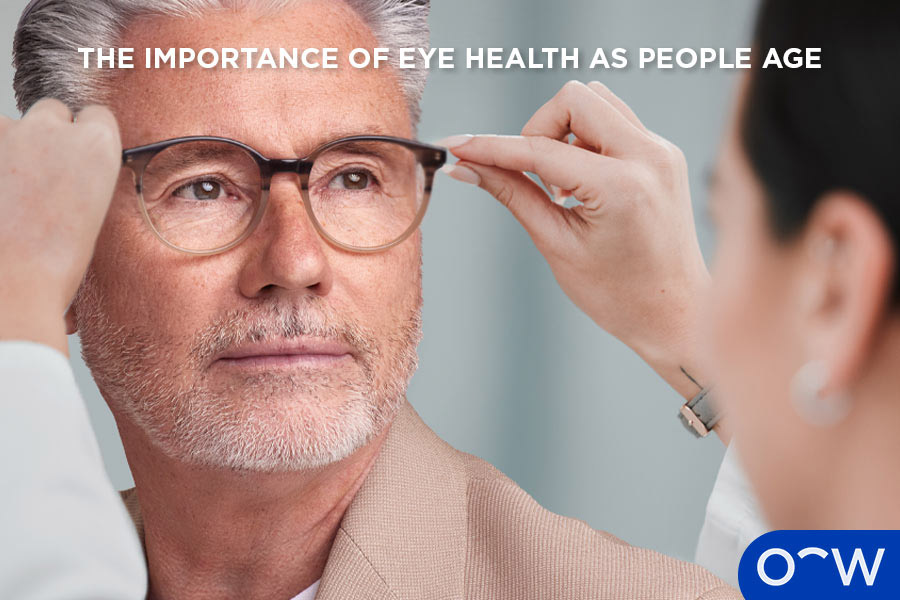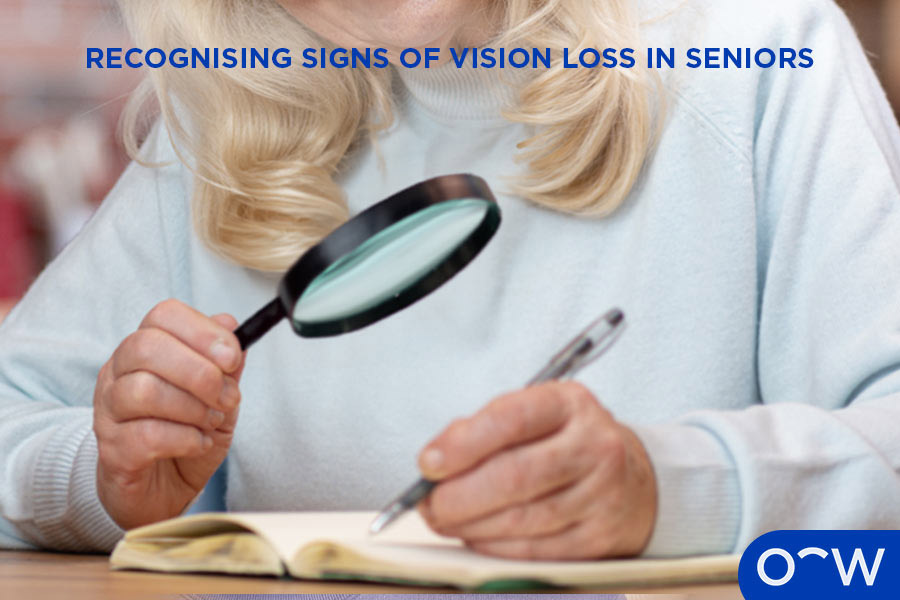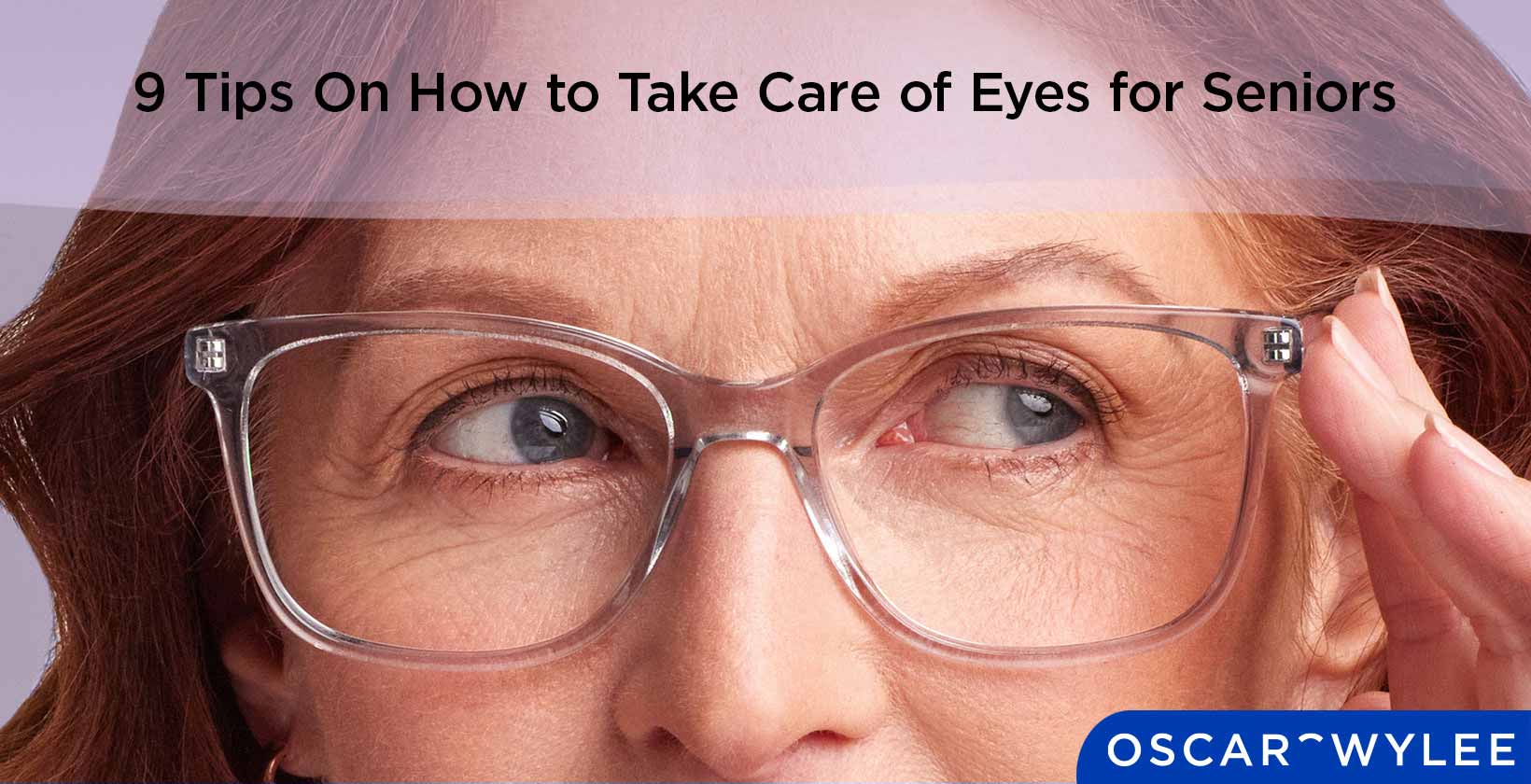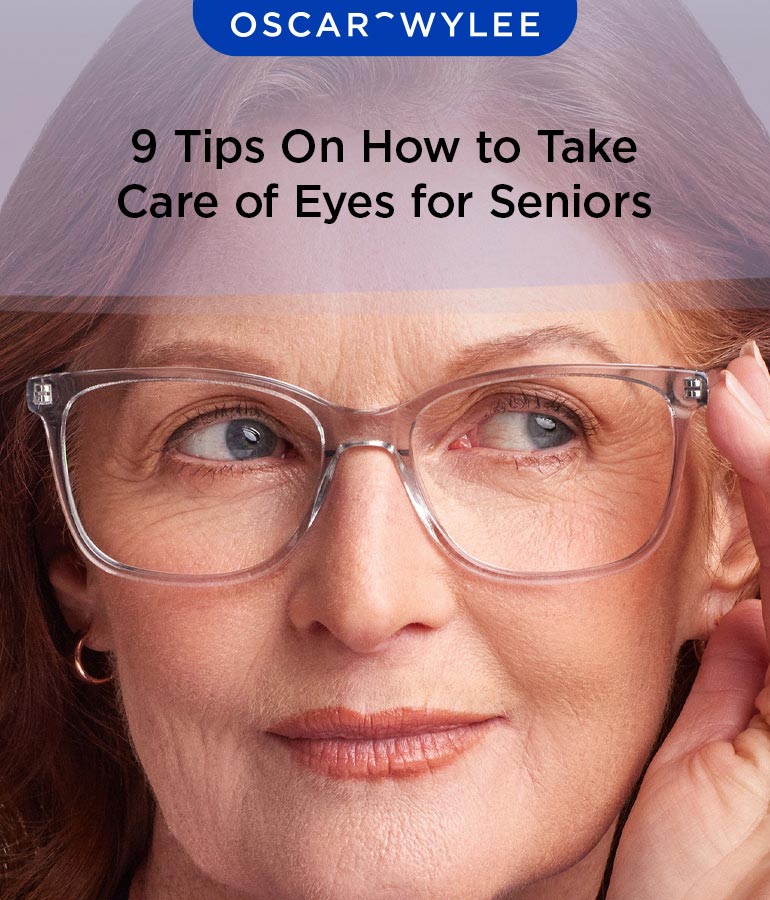9 Tips on How to Take Care of Eyes for Seniors
Published on October 24th, 2024
Updated on November 6th, 2024
The 9 ways to take care of the eyes for seniors include having regular eye exams, wearing UV-blocking sunglasses, managing health conditions, staying hydrated, eating a healthy diet, using proper lighting, managing dry eyes, and exercising regularly. These tips are perfect for eye care at home for elderly people, due to their simplicity and ease of integration within their daily schedule. Eye care is important in every stage of life, and the senior years are no exception. Maintaining eye care for seniors is important to remain healthy and more independent in their later years.
The 9 ways to take care of senior eye care include having regular eye exams, wearing UV blocking sunglasses, managing health conditions, staying hydrated, eating a healthy diet, using proper lighting, managing dry eyes, and exercising regularly. The 9 ways to take care of senior eye care are listed below.
- Regular Eye Exams: Regular eye exams are important for keeping track of eye health in the elderly years. The optometrist that administers the test can assess for age-related conditions such as cataracts, glaucoma, and macular degeneration, and provide professional advice and treatment if needed.
- Wear UV-Blocking Sunglasses: It is important for an elderly person to wear UV-blocking sunglasses to minimise exposure to ultraviolet (UV) rays, which can damage the cornea, lens, and even the retina over time. Overexposure to sunlight can increase the risk of photokeratitis and pterygium and cause increased photosensitivity in elderly eyes.
- Manage Health Conditions: As people get older, managing overall health conditions becomes essential, as certain systemic conditions can impact ocular health. For instance, diabetes can lead to diabetic retinopathy, while hypertension (high blood pressure) may contribute to retinal vein occlusion. Staying on top of these conditions is critical to preserving vision.
- Stay Hydrated: We all need water to survive, and staying hydrated is a simple but key way to maintain eye care at home for elderly people. Proper hydration helps prevent dry eyes, a common issue in seniors, and keeps the tear film functioning effectively to protect the cornea and provide necessary lubrication.
- Eat a Healthy Diet: Eating a healthy diet rich in omega-3 fatty acids, lutein, zeaxanthin, zinc, and vitamins C and E is beneficial for eye health. These nutrients can help slow down the progression of age-related macular degeneration (AMD) and cataracts by supporting the retina and overall eye function.
- Use Proper Lighting: It is important that elderly people use proper lighting fixtures in their homes to accompany their everyday activities, whether it’s reading a book or watching TV. Light bulbs should be considered through the Kelvin rating. The lower the Kelvin rating, the warmer the light and the less harsh it will be on elderly eyes.
- Quit Smoking: Smoking is proven to lead to decreased vision and potentially blindness through diseases such as cataracts and age-related macular degeneration. It is important that measures are taken in order to ease, and ideally stop regular smoking, if an elderly person in your life still does so.
- Manage Dry Eyes: Aging can lead to slower tear production and drier eyes. Seniors should manage dry eyes by regularly taking eye drops. A medical professional or pharmacist should prescribe the most suitable eye drops for seniors to use. Additionally, ensure you follow the guidelines by the manufacturer.
- Exercise Regularly: Exercising is important in every stage of life, and continuing to do so in the senior years will allow you a higher likelihood of better eye health. Those who do not exercise regularly put themselves at higher risk of diabetes, which can lead to diabetic retinopathy which causes retinal damage that can lead to blindness.
1.Regular Eye Exams
Receiving regular eye exams or eye tests are crucial for maintaining eye health within elderly people. It is recommended that those over 65 should receive an eye test at least once a year. If an elderly person already has an existing medical condition, particularly eye-related, they may want to do more than one, depending upon their optometrists recommendation. Eye exams include tests such as the visual acuity test, wherein patients are asked to say aloud a series of letters which get smaller to determine visual sharpness. For elderly people, the risk of developing eye-related issues such as cataracts is increased. That’s why it is so important that elderly people attend eye exams. An optometrist can provide a professional, informed opinion and give advice based on the elderly patient’s specific needs and medical history. With professional advice, elderly people can take proactive and preemptive steps to ensure they maintain optimal eye health.
2.Wear UV Blocking Sunglasses
An elderly person will benefit from wearing a pair of UV-blocking sunglasses if they are out and about often. Excessive UV light can accelerate the growth of cataracts and the conjunctiva called a ‘pterygium,’ making it important to have a layer of protection. UV 400 Protection Lenses effectively block 100% of the sun’s ultraviolet rays, making them invaluable on an especially sunny day. UV 400 Protection Lenses are designed to prevent up to 400 nanometres of UV light rays from penetrating the eyes by blocking, absorbing or reflecting the UV light. This UV protection will have special lenses that are either coated with UV protection on the lens or have UV protection built into them. These UV blocking sunglasses will ultimately allow for lessened eye strain and headaches which are often the result of too much sun.
3.Manage Health Conditions
For the elderly, managing health conditions becomes a more integral part of their lives. This maintenance is important for preserving eye health in the later years. Chronic diseases such as diabetes and high cholesterol can have detrimental impacts on vision. Diabetic retinopathy is a common symptom of diabetic people and is the fourth leading cause of blindness in Australia according to the National Library of Medicine. Continued management of chronic illnesses in old age such as these will ultimately play a part in the reduction of serious eye problems, and increase overall health wellbeing.
4.Stay Hydrated
Staying hydrated is the key to maintaining health in all areas of our body, and the way people see is no exception. The human eye is composed of approximately 98% water, making proper hydration essential for maintaining its health and function. Elderly people are in one of the highest risk groups for dehydration, with inadequate fluids being one of the most frequent causes of hospitalisation for senior citizens, according to Connect Ability Australia. When dehydration occurs, the body produces fewer tears. This can lead to drier eyes, which often causes irritation and blurry vision. According to the Victoria State Government Department of Health, 6-8 cups of water a day is ideal. Hydration helps for overall health and vision.
5.Eat A Healthy Diet
Eating a healthy diet can affect the way we see. For elderly people, a healthy diet may look different to how it would be in the past due to potentially newfound food intolerances. However, it is still important to maintain a healthy, rounded diet. There are even certain foods that are specifically good for eye health. Harvard Health states that vitamins, A, C, E, the mineral zinc and the omega-3 fatty acid DHA help maintain good eyesight and eye health. Foods that contain this include fish, nuts, seeds, leafy greens, yellow and orange fruits. It is good to incorporate these foods regularly, if these aren’t already included in their diet. It is important to consult a doctor before incorporating less familiar foods into a diet, especially if an elderly person suffers from food sensitivity. A healthy diet with these foods included is a great way to help maintain eye health.
6.Use Proper Lighting
Proper lighting is important for elderly people to have as they go about their daily activities, whether it’s reading or watching TV. As they likely spend a lot of time at home, it’s important that the lighting fixtures are optimal to maintain their eye health. Warm light sources are the best to help mitigate glare and eye strain. Windows are good for blocking and filtering in warm light. Light bulbs should be considered through the Kelvin rating which often determines the type or colour of light produced by the bulb. The lower the Kelvin rating, the warmer the light and the less harsh it will be on elderly eyes. An improvement in home lighting will ultimately allow for less eye strain for the elderly as they undergo their everyday routine.
7.Quit Smoking
Quitting smoking will be likely beneficial to eye health as it is to the rest of the body. A negative effect of smoking is that it is known to lead to eye diseases that cause vision impairment such as cataracts and age-related macular degeneration. Age-related macular degeneration is a big risk for those over 50 with a history of smoking, making it a concern particularly for older people. It is important that measures are taken in order to ease and ideally stop regular smoking, if an elderly person in your life still does so. This will ensure better overall health as well as less risk of harm to your vision.
8.Manage Dry Eyes
Dry eyes can be more than just an irritation, which is why they are important to manage. Prolonged dry eyes may lead to eye inflammation, abrasion of the corneal surface, corneal ulcers and vision loss. This is why it is important to take notice of when your eyes are becoming drier. To combat dry eyes, eye drops are an effective solution. You can even make small changes to your living environment, such as adding a humidifier to common rooms to add moisture into the air. Making small changes such as these are a great way to manage eye care at home for elderly people.
9.Exercise Regularly
Exercising regularly is a great way for elderly people to take care of their eyes. Staying physically active is great for overall health as well as good for eye health. Those who do not exercise regularly put themselves at higher risk of diabetes, which can lead to diabetic retinopathy which refers to retinal damage that can lead to blindness. According to the Australian Government’s Department of Health and Aged Care adults 65 and above should have 30 minutes of moderate activity most days. Exercise will look different for Seniors as opposed to other age groups however it is still possible to stay active consistently. Walking, water aerobics, easy levels of Yoga, and Tai Chi are common activities amongst Seniors that are viable exercise options to take part in and enjoy.
What is the Importance of Eye Health as People Age?
As people age, maintaining eye health becomes important due to the increased risk of age related eye conditions. The National Eye Institute (NEI) states that nearly 50% of adults over 75 experience visual impairment. Visual impairment can diminish quality of life and mobility. It can put elderly people in a more vulnerable state and reduce their independence. That is why maintaining eye health is imperative for the elderly. By following these tips, they will be able to better stay on top of their eye care habits.


What Common Eye Problems Do Seniors Face?
There are eye diseases that become a bigger risk for elderly people, making senior eye care important to manage in the older years. The common eye problems seniors face may include age-related macular degeneration, cataracts, glaucoma, dry eye syndrome and Presbyopia. These common eye problems entail the following.
- Age-Related Macular Degeneration: Age-Related Macular Degeneration is an eye condition that affects central vision. Key risk factors of age-related macular degeneration (AMD) include age, family history, smoking, and high blood pressure. This can be managed through regular eye exams, quitting smoking and an improved diet.
- Cataracts: Cataracts occur when the eye’s lens becomes cloudy, resulting in blurred vision. Age is the primary risk factor for cataracts alongside intense UV exposure and smoking. Often, cataract surgery becomes the most viable option when vision becomes particularly compromised.
- Glaucoma: Glaucoma is usually caused by an increase in Intraocular Pressure (IOP) which causes damage to the optic nerve. According to Glaucoma Australia, someone is 10 times more likely to develop glaucoma if a direct relative has it as well as if they are over 50 or have diabetes. Eye drops are the main treatment, or surgery if the problem is severe.
- Dry Eye Syndrome: A common eye syndrome that occurs when the eyes do not produce enough tears, resulting in redness and extreme irritation. It is common in elderly people.
- Presbyopia: Presbyopia is a condition that forms through ageing wherein your eyes become less able to focus over time. It can be treated with the prescription of contact lenses, eyeglasses, or medication such as eye drops. A medical professional or pharmacist should prescribe the most suitable eye drops to treat Presbyopia. Additionally, ensure you follow the guidelines by the manufacturer. An eye test should be booked to get a set that best suits your current condition if your current eyewear isn’t as effective as it once was.
When are Prescription Glasses Needed for Seniors?
Prescription glasses are needed for seniors when they experience worsened vision. This worsening can be the result of diseases such as cataracts, presbyopia and glaucoma. These eye diseases impair clarity and peripheral vision. Prescription glasses may be required for particular activities such as reading, driving, watching television and high attention activities such as knitting.
What Foods are Beneficial for Eye Health for Seniors?
There are many foods you can incorporate into your diet to enrich eyesight. These include carrots, spinach and kale, fatty fish and whole grains. The foods that are beneficial for eye health are listed below.
- Carrots: Rich in Vitamin A to support night vision and overall eye health.
- Spinach and Kale: These are high in Vitamin C and Vitamin E which help protect against macular degeneration and cataracts. Kale and spinach also contain lutein and zeaxanthin, which are vital in slowing the progression of macula degeneration.
- Fatty Fish: Contains plenty of omega-3 fatty acids and Vitamin D to support retinal health and dry eye symptoms.
- Whole Grains: Provide Vitamin E and zinc which help reduce the risk of age related vision issues.
How can Seniors Protect their Eyes from UV Rays?
There are many things Seniors can do to protect their eyes from UV rays, including wearing sunglasses, wide brimmed hats and eating well. Firstly, wearing sunglasses with high UV blockage is important to shield their eyes from unnecessary sun exposure. They can try wrap-around sunglasses to obstruct light filtering from the sides for more protection. Secondly, wearing wide-brimmed hats can also shield their eyes and face on sunnier days. Thirdly, their diet can also combat potentially harmful UV effects. Leafy greens are rich in antioxidants which are known to protect against sun damage. These are simple but effective ways to protect against UV rays in your everyday routine.
How Do You Recognise Signs of Vision Loss in Seniors?
There are some signs of vision loss in seniors that can be easily recognised. These include blurred vision or complete loss of sight, seeing ‘floaters,’ eye pain, double vision, or redness and swelling in the eye. These signs of vision loss are listed below.
- Blurred Vision or Complete Loss of Sight: A senior should notify a professional if their vision is starting to blur, or go away altogether.
- Floaters: This is when tiny specks or ‘cobwebs’ start to float across your vision.
- Eye Pain: Eye pain can be a sign of eventual vision loss among Seniors.
- Double Vision: Double vision in the elderly can result from a variety of causes such as refractive errors.
- Redness or Swelling of the Eye: Redness in the eye is a symptom of Uveitis which can lead to vision loss. It is important to get this checked out.


How to Safely Use Eye Drops and Ointments for Seniors?
It is important to safely use eye drops for seniors to ensure they can reap the full benefits in an effective manner. To safely administer eye drops to seniors you should wash your hands, have eye drops in reach, tilt your head, apply eye drops and then let it settle in the eye. The steps to use eye drops are listed below.
- Wash hands: Wash both your hands so you do not get any dirt or bacteria in the eye and take out any contact lenses you might have.
- Have eye drops in reach: Get your eye drops out. Ensure they are in reach from where you are sitting for easy access.
- Tilt your Head: You will need to move your head back and upwards, so the eye drops stay in the eye as they are administered.
- Apply eye drops: Squeeze the eyedropper tool or bottle of eye drops slowly. Apply as many drops as the instructions or their healthcare professional has advised. Make sure the bottle does not touch your eye.
- Let it Settle in the Eye: Close your eyes and press gently on the tear ducts, or the inner corner of the eye. Do this for a minute or two so the eye drop stays in place.
How can Seniors Reduce Eye Strain when using Digital Devices?
To reduce eye strain when using digital devices seniors can follow a few simple tips including comfortable set ups, adjusting screen brightness and considering blue light glasses. Firstly, it is important to create a comfortable set up. Ensure they have proper lighting and minimise glare from windows and overhead lights by using soft lighting. Adjust their screen’s brightness to match the room lighting and increase the text size to one which does not require any straining. Secondly, they should maintain a comfortable distance from the screen at ideally an arm’s length. This could mean pushing their computer further back on the desk, or setting up a phone holder on their table or desk to have it at a distance and at eye’s length. Lastly, consider using a blue light filter on devices, which are used to reduce exposure to harmful blue light rays. These steps will allow the elderly to use digital devices safely and ensure less harm is being done to their eyes.
What are the Benefits of Prescription Sunglasses for Seniors?
Prescription sunglasses are sunglasses that have in-built prescription lenses, whilst also ensuring sun protection. The benefits of prescription sunglasses for seniors include enhanced vision, UV protection, reduced sun glare, and outdoor comfort. These benefits are listed in detail below.
- Enhanced Vision: Enhanced vision is a feature of prescription lenses that will enable you to have visual clarity alongside sun protection.
- UV Protection: UV protection is a benefit of prescription sunglasses as it shields eyes from excessive ultraviolet rays, ensuring macular degeneration is reduced.
- Reduced Sun Glare: Reduced sun glare will come from wearing prescription lenses to minimise glare from surfaces like water and roads to allow for safer driving.
- Outdoor Comfort: Outdoor comfort is more easily achievable with prescription sunglasses with activities such as walking and gardening becoming much easier due to decreased eye strain.





